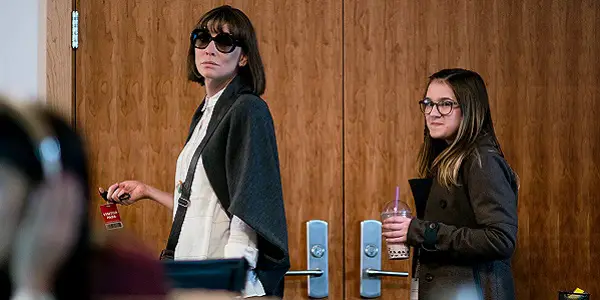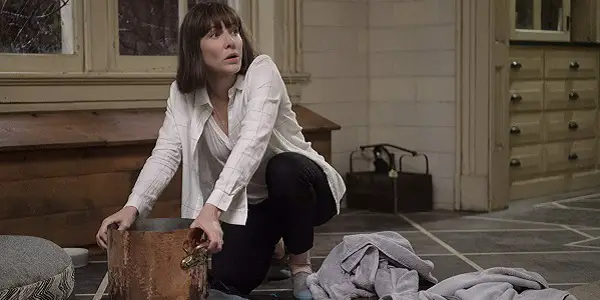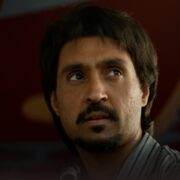WHERE’D YOU GO, BERNADETTE: Even Brilliant Blanchett Can’t Save This Mess

Lee Jutton has directed short films starring a killer toaster,…
Maria Semple’s 2012 novel Where’d You Go, Bernadette is an oddball comic masterpiece that, when one glances over the synopsis, sounds like it should be a disaster. Told primarily through a series of documents being collected by the titular character’s daughter – emails, memos and so on – it paints a vibrant portrait of a troubled yet brilliant woman who disappears on the eve of a family vacation. As Bernadette’s daughter attempts to piece together the story of her mother’s disappearance, she gradually begins to understand how her mother transitioned from celebrated architect to eccentric agoraphobe.
Thanks to Semple’s sharp yet sensitive storytelling skills, which she developed working on shows such as Mad About You and Arrested Development, the novel Where’d You Go, Bernadette is a surprisingly hilarious portrait of one woman’s struggle to overcome everything holding her back from being her best self. Unfortunately, the film of the same name is a pale shadow when compared to the bright, bold prose of Semple’s novel. Directed by Richard Linklater and starring the great Cate Blanchett as Bernadette, Where’d You Go, Bernadette is largely a disappointment despite the incredible source material and the amount of talent involved in bringing it to the screen.
Taking Flight
Bee (Emma Nelson), the bright teenage daughter of Bernadette and high-flying Microsoft executive Elgin (Billy Crudup), is set to attend the elite Choate Rosemary Hall boarding school in the fall. Before she does, she reminds her parents that they said she could have any gift she wanted if she had perfect report cards all the way through her time at her current school. Bee’s choice of gift? A family cruise to Antarctica.
Needless to say, the idea of being trapped on a boat with 150 strangers sends the exceptionally anti-social Bernadette into a tailspin. This is a woman who so dreads contact with other people that she entrusts literally any and all tasks in her life to a remote assistant, Manjula, to whom Bernadette dictates via email requests ranging from the scheduling of a dentist appointment to the purchasing of a fishing vest. The other mothers at Bee’s school, including next-door neighbor Audrey (Kristen Wiig) and Elgin’s eager new administrative assistant, Soo-Lin (Zoe Chao), see Bernadette as a strange snob who thinks she’s too good to have anything to do with them, when in actuality her eccentricities are rooted in something much deeper.

Before their move to Seattle, Elgin and Bernadette lived in Los Angeles, where Bernadette was an up-and-coming architect whose innovative work focused on minimizing waste earned her a MacArthur “genius” grant. But after one big project went awry thanks to the interference of a billionaire television magnate, Bernadette retreated inward and refused to create any new works.
Now, years of living in Seattle for Elgin’s career and focusing on raising Bee above anything else have started to catch up with Bernadette’s psyche. A woman whose inner workings contain so much creativity needs an outlet for her imagination, or she’ll eventually burst from keeping it all bottled up inside. The dreaded trip to Antarctica is in fact just a catalyst for what has been a long time coming: Bernadette’s disappearance.
Risk Averse
The book version of Where’d You Go, Bernadette begins with the titular character’s disappearance and works backward, and in a zig-zag line at that, as Bee begins to unravel the tangled knot that is her mother’s past and her reasons for needing to run off and regroup. It’s a clever, albeit risky, storytelling structure that pays dividends on the page.
However, Linklater and co-writers Holly Gent and Vince Palmo, who previously scripted Me and Orson Welles for Linklater, opt for a more straightforward, chronological structure, meaning that Bernadette’s disappearance kicks off the final act of the film instead of the entire story itself. The mystery is all too quickly solved, erasing a great deal of the emotional tension of the novel in favor of easy sentimentality.
This is just one of the many ways in which it feels like Linklater was intimidated by the task of adapting Semple’s singular work – an odd impression to get from a filmmaker whose career highlights include such ambitious projects as Boyhood, the Before trilogy, and A Scanner Darkly, among so many other indie landmarks. One would think that such an unusual novel would be an ideal challenge for Linklater, but instead, Where’d You Go, Bernadette ends up being his least imaginative and most mainstream work in quite some time. While that might make the story more accessible, it also does it a disservice.

To fill in the blanks of Bernadette’s past for both Bee and the audience, long segments of a documentary on Bernadette are slotted into the movie, as is a detailed conversation Bernadette has with an old friend played by Laurence Fishburne. Blanchett’s delivery of what is essentially a hyper-personal monologue summarizing the last twenty years of her life is as delightful as she could make it, but even a woman who should be regarded as one of the greatest actors of her generation can’t save the scene from feeling like lazy screenwriting.
The Great Cate
That being said, Blanchett is dynamite in Where’d You Go, Bernadette; both bitingly funny and painfully sensitive, she embraces all of the quirks of Semple’s creation without ever coming across as a cartoon. Indeed, Blanchett brings both the beauty and the ugliness inherent in this complicated character to such intense life that it is not only impossible to not sympathize with her even in her wildest moments, but it also makes you truly hate everyone else in the film, save Bee, for not properly understanding her.
Crudup, in particular, is lacking in his usual charms as workaholic Elgin, whose abrupt change of heart in the final act of the film rings utterly false after watching him berate his wife for her anxieties over the previous two hours. Fortunately, the third act is also full of gorgeous scenery, courtesy of some location shooting in Greenland, that makes the haphazard storytelling much easier to swallow.

Even when Bernadette does insane things like put up a billboard criticizing her neighbors or fall asleep in the middle of a drugstore while waiting for a prescription, one can’t help but feel that she’s suffering from being the only remotely interesting person in town. From her severe bobbed hair reminiscent of Anna Wintour to her penchant for hyper-practical clothing like that aforementioned fishing vest, everything about Bernadette is just odd enough to feel utterly real – and Blanchett is what brings that home. It’s just unfortunate that such a great performance is stranded amid such a subpar film.
Where’d You Go, Bernadette: Conclusion
Where’d You Go, Bernadette is a film that is somehow less than the sum of its parts. The story focuses on the importance of women being able to follow their passions and not live their lives utterly beholden to others, yet the film itself feels remarkably lacking in passion from those involved, save Blanchett.
What do you think? Have you read Maria Semple’s novel? What do you think would have made this a better adaptation? Share your thoughts in the comments below.
Watch Where’d You Go, Bernadette
Does content like this matter to you?
Become a Member and support film journalism. Unlock access to all of Film Inquiry`s great articles. Join a community of like-minded readers who are passionate about cinema - get access to our private members Network, give back to independent filmmakers, and more.
Lee Jutton has directed short films starring a killer toaster, a killer Christmas tree, and a not-killer leopard. Her writing has appeared in publications such as Film School Rejects, Bitch: A Feminist Response to Pop Culture, Bitch Flicks, TV Fanatic, and Just Press Play. When not watching, making, or writing about films, she can usually be found on Twitter obsessing over soccer, BTS, and her cat.













